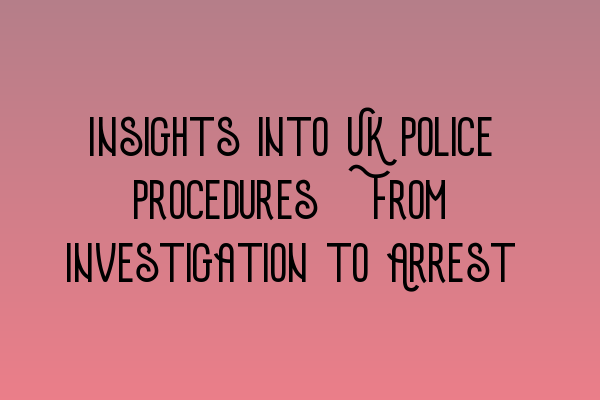Insights into UK Police Procedures: From Investigation to Arrest
When it comes to criminal law in the UK, police procedures play a crucial role in ensuring a fair and just legal system. From the beginning stages of an investigation to the moment of arrest, a careful and meticulous approach is taken by law enforcement authorities to gather evidence, apprehend suspects, and uphold the principles of justice. In this article, we will provide you with valuable insights into the various steps involved in UK police procedures, shedding light on this crucial aspect of the criminal justice system.
The Investigation Process
Every criminal case begins with an investigation. Whether it’s a minor theft or a serious offense, the police are responsible for gathering evidence and building a case against the perpetrator. During the investigation process, several key steps are followed:
- Receiving the Report: When a crime is reported, the police are notified, either by the victim, a witness, or another individual. The report provides initial details about the offense and helps the police determine the appropriate course of action.
- Gathering Evidence: Once the report is received, the police start gathering evidence. This may involve interviewing witnesses, collecting CCTV footage, examining physical evidence, and obtaining expert opinions if necessary. The goal is to establish the facts surrounding the crime and identify potential suspects.
- Identifying Suspects: Based on the evidence gathered, the police work to identify and narrow down potential suspects. This may involve conducting background checks, analyzing patterns, and seeking expert advice to ensure a proper investigation.
- Arrest Warrants: In cases where sufficient evidence is obtained, the police may apply for an arrest warrant from a court. This ensures that the arrest is lawful and valid.
The Arrest Process
Once a suspect has been identified, the next step in UK police procedures is the arrest process. It is important to note that an arrest is not the same as a conviction. An arrest simply means that the person is being taken into custody and will face further legal proceedings. Here are the key steps involved:
- Informing the Arrested Individual: When making an arrest, the police must inform the individual of the grounds for their arrest and their rights. This ensures that the person understands the nature of the offense and the legal process they will be going through.
- Cautioning and Interviewing: After the arrest, the police may caution the suspect, informing them that anything they say during the interview may be used as evidence against them. The purpose of the interview is to gather further information about the case and obtain the suspect’s account of events.
- Detention and Custody: Following the interview, the suspect may be detained and held in police custody. This allows the police to continue their investigations, collect further evidence, and ensure the safety of the suspect and the public.
- Possible Charges: Based on the evidence gathered and the outcome of the investigation, the police may decide to press charges against the suspect. This decision is made in consultation with the Crown Prosecution Service (CPS) and is based on the strength of the evidence and the likelihood of securing a conviction.
Conclusion
Understanding UK police procedures is essential for anyone involved in the criminal law system, from solicitors to aspiring lawyers. The investigation process and the arrest process are complex and intricate, with each step carefully designed to ensure fairness and justice. By gaining insights into these procedures, we can appreciate the efforts made by law enforcement authorities to maintain order and uphold the rule of law.
For more information on topics related to criminal law and legal practice, make sure to check out our related articles:
- SQE Exam Prep: Essential Study Materials for Aspiring Solicitors
- Demystifying the Solicitors Qualifying Examination Format
- SQE Exam for International Lawyers: Challenges and Success Strategies
- LLC Formation Made Simple: Step-by-Step Guide for UK Entrepreneurs
- LLC Formation: A Step-by-Step Guide for UK Entrepreneurs
